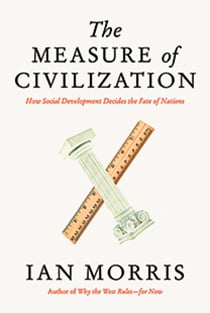Review: The Measure of Civilization: How Social Development Decides the Fate of Nations
By Ian Morris
Share
 Scholars have long tried to determine how the West, now that its world-historical heyday is passing with the rise of Asia, came to dominate the globe in the past few centuries, and what the factors involved might foretell about the future. It’s an issue that preoccupied previous generations of Western intellectuals who watched it happened, notes Morris, a classicist at Stanford and author of Why the West Rules—For Now (2010). The earlier explanations tended to boil down to simple racism. Westerners were finer, better people—or, occasionally, the exact opposite: Europeans took over the world, Kurt Vonnegut once sardonically remarked, because “we are the meanest sons of bitches on the planet”—or to more sophisticated, if poorly articulated, concepts of the superiority of Western thinking.
Scholars have long tried to determine how the West, now that its world-historical heyday is passing with the rise of Asia, came to dominate the globe in the past few centuries, and what the factors involved might foretell about the future. It’s an issue that preoccupied previous generations of Western intellectuals who watched it happened, notes Morris, a classicist at Stanford and author of Why the West Rules—For Now (2010). The earlier explanations tended to boil down to simple racism. Westerners were finer, better people—or, occasionally, the exact opposite: Europeans took over the world, Kurt Vonnegut once sardonically remarked, because “we are the meanest sons of bitches on the planet”—or to more sophisticated, if poorly articulated, concepts of the superiority of Western thinking.
Neither concept has a leg to stand on, but Morris’s real topic is the imprecision of all the arguments, the inability of scholars to establish metrics by which to measure one civilization against another, or even to agree on terms. Consider his own conclusion that for 90 per cent of the past 15,000 years, the West has been the planet’s most advanced region, the exception being the 1,200 years from about 550 to 1750 CE, when East Asia led the world. This is liable to startle readers unaccustomed of thinking of Turkey, Iraq or Iran—Eastern realms to most Westerners—as parts of a broad Western way of life, which they were in the long sweep of history. Morris’s definition is a useful reminder of how culturally determined our geopolitical terminology is: we do not call the westernmost edge of Asia the “Middle East” for any justifiable geographical reason.
Morris sets out to establish metrics to quantify civilizational capacities—energy capture, social organization, ability to wage war, and what would now be called information technology—and to measure them, both enterprises wide open to criticism. But he deserves only praise for his attempt to establish what exactly we are talking about.
Visit the Maclean’s Bookmarked blog for news and reviews on all things literary